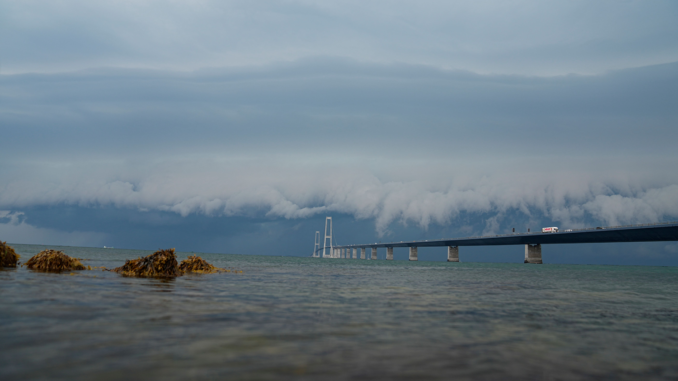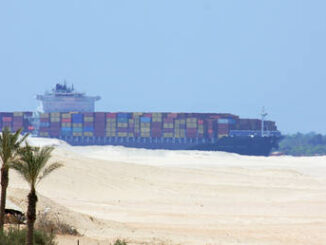
The maritime order is falling apart under geopolitical pressure.
It was only a matter of time before Russia’s fast-growing shadow fleet, a group of vessels whose owners do their utmost to conceal their identity while carrying oil to evade sanctions on Moscow, started becoming a serious maritime risk. Russian vessels are now regularly turning down pilotage in Danish waters, the Financial Times reports—a practice that not only breaches maritime etiquette but could also lead to a disastrous accident.
The collision involving a container ship and Baltimore’s Francis Scott Key Bridge in the United States on March 26 demonstrates the dangers involved when bulky ships vessels through difficult waters. Indeed, the Dali struck the bridge despite being steered by two pilots. Even if just a small share of vessels turn down pilotage, similar disasters risk becoming commonplace.
International maritime rules strongly recommend the use of pilots with specialized local knowledge for most vessels sailing through Denmark’s Great Belt, the narrow passage between the country’s largest islands. The Great Belt is not just narrow—it also has treacherous waters and is extremely busy: Every year, some 70,000 vessels pass through the Great Belt and the nearby Sound (Oresund), which sits between the shores of Denmark and Sweden. It’s standard practice to follow international maritime recommendations and take on an experienced local pilot when it comes to difficult navigation routes, whether that’s the Great Belt or the Suez Canal.
The Geography of the Danish Straits
A map shows the narrow waters of the Danish Straits around Denmark.
Foreign Policy
For the sake of maritime order and safety, Copenhagen could block ships that refuse pilotage. That, though, might trigger a standoff with Russia—if Moscow admits its role as a patron of the shadow fleet. Indeed, blocking these rule-breaking vessels would itself violate international maritime rules. Before forcing such a choice, however, the open-source intelligence community could help by revealing the identities and whereabouts of shadow vessels’ owners.
Since the beginning of this year, at least 20 tankers that are suspected to be shadow vessels transporting Russian oil have refused to take Danish pilots on board, according to internal reports leaked to the Financial Times and the Danish research group Danwatch.
That’s at least 20 tankers that have sailed through the Baltic Sea—in most cases via the Gulf of Finland, passing through the exclusive economic zones of Finland, Estonia, Latvia, Lithuania, Sweden, and Germany—into Danish waters and the Great Belt, from which they have traveled on to Kattegat (comprising Danish and Swedish waters) and Skagerrak (Danish and Norwegian waters) and into the North Sea and the oceans that will bring them to their buyers in countries such as India and China.
Shadow vessels are clapped-out ships that spend their last remaining years providing transportation to and from sanctioned countries that official vessels and their owners won’t touch. The risk that these and other dark vessels pose to coastal states is further increased by the fact that they sail under the flags of countries unlikely to come to anyone’s aid if they cause accidents or incidents (Gabon is a particular favorite) and don’t undergo regular maintenance. Any accident—be it a collision or an oil leak—is likely to be doubly disastrous as a result.
Add to that the fact that their owners are hard to track down—and that they lack proper insurance. If a shadow vessel were to sustain a massive oil spill in, say, Finnish waters, Finnish authorities and taxpayers would end up on the hook. And shadow vessels are more likely than law-abiding ones to be involved in accidents since they frequently turn off their AIS (automatic identification system), a GPS-like navigation tool that allows vessels to see one another.
Since the start of Russia’s full-scale invasion of Ukraine, Russia’s attempts—often successful—to avoid sanctions have caused the shadow fleet to balloon; it’s currently thought to encompass some 1,400 vessels, though like all illicit activities, it’s impossible to measure precisely. (My report about the shadow fleet from last December provides an in-depth examination of the ships and the threats posed by them.)
If oil spills do occur, the International Maritime Organization’s (IMO) International Oil Pollution Compensation Funds assist the countries affected. But if oil and other toxic spills increase substantially, as they’re likely to do as a result of the shadow fleet, the fund won’t have enough money to compensate everyone.
So should Denmark simply block shadow vessels refusing pilotage, or all shadow vessels for that matter?
Not so fast. Yes, shadow vessels violate international maritime rules and conventions—but the United Nations Convention on the Law of the Sea (UNCLOS) gives all vessels the right of so-called innocent passage, meaning the right to sail through other countries’ territorial waters and exclusive economic zones. The fact that shadow vessels violate maritime rules doesn’t give coastal states the right to violate the rules in turn.
And, noted retired Rear Adm. Nils Wang—a former chief of the Danish Navy, which also covers a range of coast guard tasks—“according to international law, the Danish Straits are international straits and are not under Danish jurisdiction. For this reason, too, Denmark doesn’t have the legal right to force ships to use pilots.”
Though most ships follow the IMO’s recommendations and use pilotage, for which they pay a fee, over the years there have been some cheapskates that turned down pilotage. In some cases, those ships caused oil spills. “Every time there’s a leak from a vessel that didn’t use pilotage, there’s an outcry to ban offenders, but we can’t,” Wang said.
Then, in the mid-2010s, the number of cheapskates traveling without pilotage grew.
Danish authorities got creative and announced that if ships with drafts (the amount that the extends beneath the waterline) of more than 11 meters (about 36 feet) didn’t request pilotage, then the Danish authorities would call them on VHF, the radio used by sailors, and remind them that they weren’t following international recommendations, and that Denmark would report them to their flag state and the IMO.
What’s more, a call on VHF allows every vessel in the vicinity to hear the conversation. “And then we started doing it,” Wang said. “And it changed behavior, because it was embarrassing for the ships and the captains to be called out like this. But if you’re part of the dark fleet, you don’t give a damn. Calling these vessels out won’t make a difference.”
Coastal states do have the right to block access in their territorial waters in certain cases—such as if transiting vessels are in poor repair or lack proper insurance. But when nations agreed and signed UNCLOS in 1982, a situation in which a country systematically evades globalization-based economic sanctions by using a fleet of dark vessels was inconceivable.
In response to the emergency of the shadow fleet, the world’s UNCLOS signatories could convene to make pilotage in sensitive waters mandatory. But such negotiations would take a long time, and under the current geopolitical conditions may never reach a conclusion. And because the Danish Straits are international waters, Denmark can’t impose new rules on its own.
This is globalization in a fiercely geopolitical era: Russia can invade Ukraine and evade the resulting sanctions by means of a fleet that sails through law-abiding countries’ waters—and their governments can’t stop it. On the contrary, with Russia now having joined Iran, Venezuela, and North Korea in using a shadow fleet, more countries will conclude that misbehaving and incurring economic sanctions is no big deal. And trade using dark vessels is cheaper than using legally operating ones.
An even larger shadow fleet would, of course, increase the risks both for marine wildlife and regular shipping. If a Russian shadow vessel collides in the Danish Straits with a legal merchant vessel, or even a Danish Navy vessel, what would Denmark do? What would NATO do?
But for now, there’s one group of dark-fleet operators that can be targeted completely legally and without risk of geopolitical escalation: the shadow vessels’ owners. They are plentiful and hide behind post office box addresses in countries such as the United Arab Emirates—because they don’t want to emerge from the shadows.
On the good side in this standoff, though, we have a large and growing community of open-source investigators, both professionals and amateurs. These investigators should take on a good deed for the global maritime order and investigate shadow-vessel owners, then share their identity and activities. Some may be hardened criminals immune to the embarrassment of public scrutiny, but many others may simply be ordinary businesspeople who have spotted an opportunity.
Just as with the ships once called out on Danish radio, public shame may be one way to force people to act for the better.



